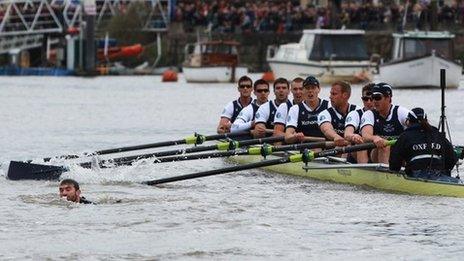Boat Race 2013: The basics on Oxford v Cambridge
- Published
When the Boat Race goes wrong
Six sinkings, one dead heat, mutiny in the camp, a swimmer in the river and two world-class boats battling with the treacherous conditions on the River Thames - drama is never far away at the Boat Race.
This year will see the 159th instalment since a challenge between Charles Merivale at Cambridge and Oxford's Charles Wordsworth led to the first race on 10 June, 1829.
BBC Sport gives you the facts and figures behind one of the oldest sporting events in the world.
THE CHAMPIONSHIP COURSE
The Boat Race course, known as the Championship Course, is four miles and 374 yards (6.8km) long and stretches from Putney to Mortlake.
This course on the River Thames has been used for every Boat Race since 1845, apart from 1846, 1856 and 1863 when the race was held in the opposite direction between Mortlake and Putney.
The race is rowed upstream and is timed to start on the incoming flood tide, usually an hour before high tide, so that the crews are rowing with the fastest possible current.
Official times are taken at fixed points: The Mile Post, Hammersmith Bridge, Chiswick Steps, Barnes Bridge and The Finish.
Last year's race was stopped shortly after Chiswick Steps due to a swimmer on the course, and the race was only restarted after a pause of more than 30 minutes.
The actual elapsed time for the winning Cambridge boat was 48 minutes 11 seconds, but the finish judge, Ben Kent, decided the final time should be how long the crews actually raced, hence the winning time is recorded as 17 minutes 23 seconds.
STATION TO STATION
The boats start from two stations - Middlesex and Surrey, which refer to the Fulham/Chiswick and Putney/Barnes sides of the course. The president of the previous year's losing club calls heads or tails and the umpire tosses an 1829 gold sovereign to decide who starts where.
Much is made of the tactical advantages or otherwise of being on the inside of the first bend (Middlesex), but history shows that neither side of the river has a monopoly on victory.
Wins from Middlesex station - 75
Wins from Surrey station - 73
WINNING STREAKS
Cambridge lead the overall head-to-head 81-76 and enjoyed the longest unbeaten run in Boat Race history when they went undefeated for 13 years from 1924 to 1936.
The best Oxford have managed is 10 years between 1976 and 1985, although Cambridge's 1986 success was their only victory in 17 years until 1993. The only dead heat occurred in 1877, although rumours from the time suggested Oxford might have edged it., external
THAT SINKING FEELING
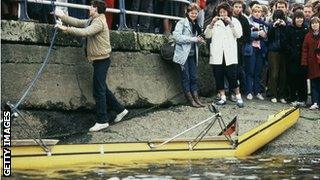
The Cambridge boat came off worse in a collision with a barge before the start in 1984
They might be packed full of top-class rowers who have spent countless hours training for this one race, but sinking remains a real danger on the River Thames. A strong southwesterly wind and a high tide is the combination that sets alarm bells ringing, and there have been six sinkings in 158 races.
In 1984, Cambridge sank during their warm-up en route to the start after hitting a moored barge, while in 1978 the Light Blues started to ship water after Hammersmith and were required to take the centre arch of Barnes Bridge. They returned the following day, when Oxford won by 3¾ lengths.
OLYMPIC LEGACY
The Boat Race has undoubtedly proved a useful springboard to Olympic success, with London 2012 no exception. Andrew Triggs Hodge and Pete Reed (Oxford) joined Tom James (Cambridge) to win gold in the four, Constantine Louloudis (Oxford) and Tom Ransley (Cambridge) won bronze in the eight and George Nash (Cambridge) won bronze in the pair.
Last summer's Games saw 13 current or former Blues compete (seven of them British), and four Olympians will be in action on Sunday, including three medallists; Cambridge president George Nash, Oxford's Constantine Louloudis and his crew-mate Malcolm Howard, who claimed silver for Canada in the eight.
THIS YEAR'S TEAMS
Oxford
Patrick Close (bow seat, USA)
Age: 27; Height: 6ft 2ins; Weight: 14st 2lbs - Currently working towards an MBA at Pembroke College, he was born and raised in the mountainous state of Montana. Described by Oxford president Alex Davidson as "level-headed and driven - the perfect calculating presence we need in the bows".
Geordie Macleod (two seat, GB/USA)
Age: 21; Height: 6ft 2ins; Weight: 13st 10lbs - Macleod is studying geography at Christ Church College, where he shares accommodation with Constantine Louloudis. He went to the nearby St Paul's School in Barnes and holds dual British-American nationality.
Alexander Davidson (three seat, GB)
Age: 22; Height: 6ft 5ins; Weight: 15st 2lbs - One of three returning Blues in the Oxford boat, he is a PhD student at Christ Church, studying chromosome and developmental biology. If he had not pursued academia he would like to have been a professional cyclist.
Sam O'Connor (four seat, NZ)
Age: 25; Height: 6ft 1in; Weight: 14st - O'Connor graduated from Harvard last summer, and is now working towards a Masters in engineering science. Only 10 months ago O'Connor was part of the Harvard eight who beat fierce rivals Yale in the USA's equivalent of the Boat Race.
Paul Bennett (five seat, GB)
Age: 24; Height: 6ft 10ins; Weight: 15st 11lbs - Bennett is the tallest rower in either boat and is "as cheerful as he is tall", according to Davidson. Bennett is studying for a Masters in computer science at Kellogg College.
Karl Hudspith (six seat, GB)
Age: 25; Height: 6ft 6ins; Weight: 14st 8lbs - Competing in his third successive Boat Race, Hudspith was Oxford president last year and is a PhD student at St Peter's College, investigating the genetics of inherited retinal degeneration.
Constantine Louloudis (seven seat, GB)
Age: 21; Height: 6ft 3ins; Weight: 14st 11lbs - A classics student at Trinity College, Louloudis took up rowing because "I was terrible at cricket so it was the only alternative". He won the Boat Race in 2011, aged 19, and claimed Olympic bronze as part of the men's eight last summer.
Malcolm Howard (stroke seat, Canada)
Age: 29; Height: 6ft 7ins; Weight: 17st 3lbs - Howard was part of the Canadian eight who won Olympic gold in 2008 and silver last summer, overtaking a GB boat featuring Louloudis. The heaviest rower in either crew, he is studying for a Masters in clinical medicine at Oriel.
Oskar Zorrilla (cox, US)
Age: 25; Height: 5ft 4ins; Weight: 8st 4lbs - The first Colombian-born competitor to take part in the Boat Race, his family left the country in the 1990s and settled in Denver. He now holds dual US nationality and is a Masters student at St Hugh's. Zorrilla's sister Julie reached the latter stages of TV show American Idol in 2011.
Cambridge
Grant Wilson (bow seat, US)
Age: 23; Height: 6ft 3ins; Weight: 14st 2lbs - Currently working towards a Masters in energy technology at Pembroke College, Wilson is the youngest member of the Cambridge crew and previously rowed at the University of Pennsylvania.
Pinsent to make refereeing debut
Milan Bruncvik (two seat, Cze)
Age: 28; Height: 6ft 1in; Weight: 13st - Bruncvik will become the first Czech rower to compete in the Boat Race. He is also the lightest oarsmen in either crew and a double Olympian. Bruncvik is studying for a Masters in in engineering for sustainable development at Peterhouse College.
Alexander Fleming (three seat, Aus)
Age: 23; Height: 6ft 5ins; Weight: 15st 5lbs - An Ivy League rowing champion during his time at Brown University, Fleming has three brothers, all of whom are taller than him. He is studying management at Pembroke College.
Ty Otto (four seat, US)
Age: 24; Height: 6ft 7ins; Weight: 14st 4lbs - Robert "Ty" Otto was a world junior champion in 2011 but missed out in the US trials for a place at London 2012. The Seattle native is studying for a Masters in nuclear energy at Hughes Hall, and chose to take up rowing because it means he can eat whatever he likes.
George Nash (five seat, GB)
Age: 23; Height: 6ft 4ins; Weight: 14st 13lbs - Cambridge's president is the only Briton rowing for the Light Blues this year. The engineering student at St. Catharine's was a Boat Race winner in 2010, but finished on the losing side the following year. He won bronze at London 2012 in the men's pair alongside Will Satch.
Steve Dudek (six seat, US)
Age: 24; Height: 6ft 8ins; Weight: 16st - The heaviest member of the Cambridge crew, Dudek is studying land economy at St Edmund's College. Part of last year's victorious crew, he admits: "I can't act like that wasn't, at least to a certain degree, a hollow victory."
Alexander Scharp (seven seat, Aus)
Age: 25; Height: 6ft 6ins; Weight: 14st 9lbs - A law student at St Edmund's, Scharp was born in Toowoomba, near Brisbane, and his nickname is 'Snake'. He rowed in last year's interrupted Boat Race, shouting "Yeah! More racing! Let's go back to the start!" when the decision came to restart.
Niles Garratt (stroke seat, US)
Age: 24; Height: 6ft 4ins; Weight: 13st 8lbs - Oxford's stroke is, like team-mate Otto, a Seattle native and was a Boat Race winner last year. A big fan of the Seattle Seahawks NFL team, the history student says his chosen karaoke song would be 'In love with myself' by David Guetta.
Henry Fieldman (cox, GB)
Age: 24; Height: 5ft 4ins; Weight: 8st 8lbs - Fieldman was born and raised a stone's throw from the tideway, and says his local knowledge will be an advantage. He was cox for Imperial College while studying Zoology, and is now working towards a Masters in psychology and education.
- Published2 April 2012
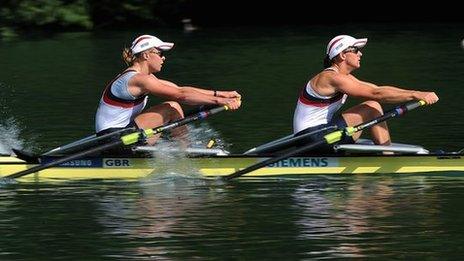
- Published29 March 2013
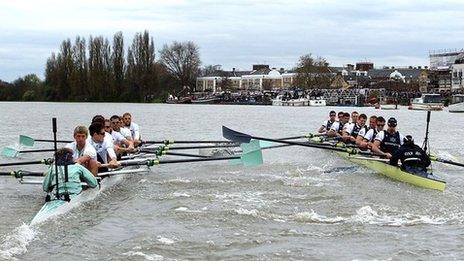
- Published28 March 2013
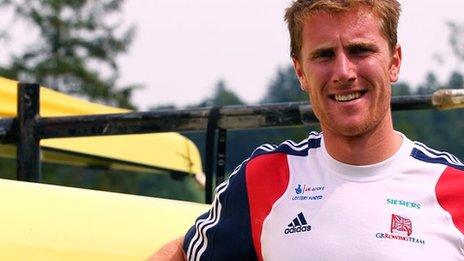
- Published31 March 2013
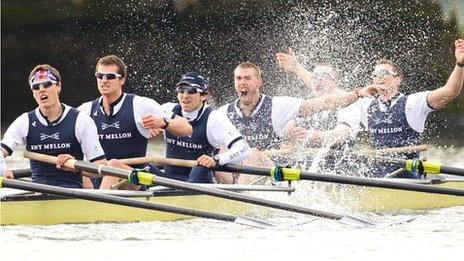
- Published14 February 2013
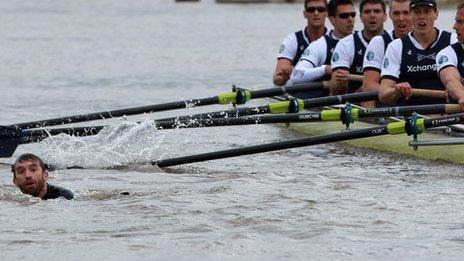
- Attribution
- Published19 October 2012
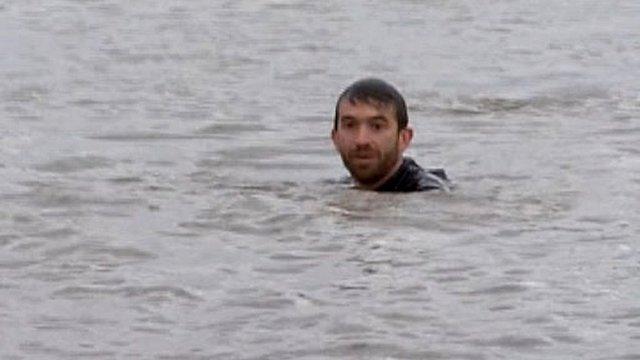
- Published8 April 2012
